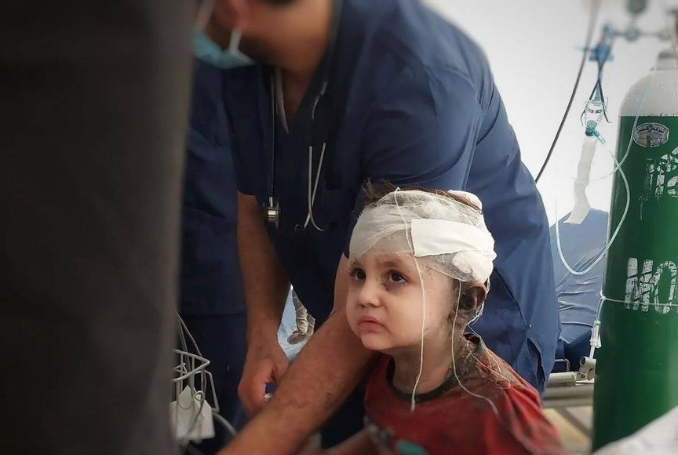
We must never give up on that. It’s people, not power, who will save the children of Gaza.
I received a message this week from my friend Yasser. He’s in the south of Gaza, Rafah to be exact, where he lives with his family.
I wrote about him for this publication before. Already at that time, the horrible had happened to his young daughter Yara. Israeli forces shot her several times from a sea vessel.
They had essentially punished her for being a Palestinian child who simply wanted to enjoy a sunny day at the beach.
Like many other Palestinians, Yasser sought justice for Yara. He got none. Human rights organizations did as much as they could to help but Israel was too powerful.
Eventually, Yasser was advised that, despite existing evidence confirming Israel deliberately opened fire on Yara, he stood next to no chance of winning in court, even if that only meant Israel being compelled to pay for surgeries Yara still needs.
When I think of how massive bullets tore through Yara, I’m amazed – though of course thankful – she’s still alive. And if I think of it for too long, I start to feel helpless. If nothing could be done to prosecute the culprits of the crime against Yara, what makes me think there’s anything I can do to help her?
The feeling was exacerbated when I received the message from Yasser. In it he relates how she was recently injured when he and his family were trying to escape Israeli bombing near where they live.
Yara fell. One of her fingers was seriously gashed. Yasser sent me photos of her bandaged, teary-eyed. She stares hauntingly into the camera.
“This child has suffered too much,” I thought. “What moral universe allows a person, not yet an adult, to endure Israeli brutality?”
For me, this is enough to doubt the existence of God – one who – as I was taught growing up in Catholic schools – to be “all good” and “powerful.” Surely such an entity would prevent the evil that is Yara’s suffering and similarly experienced by countless Palestinian children daily.

Writing this I recall former teachers. They would say God doesn’t intervene in human affairs so as to stop people from acting as they do.
This regrettably includes horrific acts that emanate from people’s choices, reflective of the freedom God has given all.
I may have once been persuaded by such theologically informed explanations in the past. But thinking of Yara now and, perhaps less naive in older age, I see them as rather lame – if God is all good and powerful, he’d at least have created mechanisms to regulate human behavior, including the pulling of the trigger by the Israeli gun person who nearly killed Yara.
The explanations also, if I’m to be totally candid, make me feel helpless. Whatever their truth value there’s nothing I can do with them. Nothing that will ease Yara’s suffering nor other children of Gaza, under constant Israeli bombardment.
What doesn’t make me feel helpless, however, is thinking of the children themselves. They motivate me. Their suffering, specifically because it’s so awful and unnecessary, makes me want to do something about it. No child – Palestinian and non-Palestinian alike – should ever have to endure it.
Instead, they are entitled to our love, care, protection. Like entitlements generally they are non-negotiable. They are owed every child as a matter of guarantee, as enshrined, for example, in the UN Convention on the Rights of the Child.
Where that guarantee is not realized we fail children. We’re seeing that with respect to Gaza right now where hundreds of thousands of children are being systematically deprived of the necessities of life to which they are entitled – food, water, healthcare and so forth.
Though the ongoing Israeli blockade is largely to blame for this we, as an international community, allow it to continue so long as we don’t intervene (e.g. pressuring Israel through additional government sanctions) to end the blockade itself.
Til then, a child in Gaza no sooner will learn to crawl than face imminent risk of dying from starvation.
“The function of faith,” writes American spiritual thinker and monk Thomas Merton, “is not to reduce mystery to rational clarity, but to integrate the unknown and the known together in a living whole, in which we are more and more able to transcend the limitations of our external self.”
Much as my spiritual or religious convictions have been shaken by the ongoing events in Gaza, especially the egregious harm done to children, I draw strength from Merton’s observation.
If only indirectly it illuminates to me that I cannot predict the future with very much certainty at all, let alone in Palestine where Israel continues to pummel – with both impunity and billions of dollars of military support from the U.S. alone – a defenseless people.
But as Merton points out I, through faith, can engage simultaneously with that uncertainty (the “unknown”) and with what I’m sure (the “known”), namely that I can act, so long as I’m alive, for what’s good.
In the case of dear Yara that means involving myself in the larger international struggle – beyond my mere physicality, the “external self” identified by Merton – against Israel’s war against Palestinian children.
Just like you I can do so through demonstrations, signing petitions, letter writing, disrupting meetings that support Israeli violence against Palestinians, amplifying pro-Palestinian messages online.
Through such activities we can draw attention to how Israel terrorizes Palestinian children – from hurting and killing them to kidnapping them in raids and confining them in “administrative detention.” Whatever the outcome of that is not totally in our hands.
Yet, given that most in this world retain a sense of right and wrong or, more simply, have a conscience, they are apt to respond in kind – exerting further efforts to protect Palestinian children from Israel.
We must never give up on that. It’s people, not power, who will save the children of Gaza.
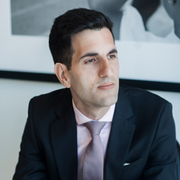
– Paul Salvatori is a Toronto-based journalist, community worker and artist. Much of his work on Palestine involves public education, such as through his recently created interview series, “Palestine in Perspective” (The Dark Room Podcast), where he speaks with writers, scholars and activists. He contributed this article to The Palestine Chronicle.




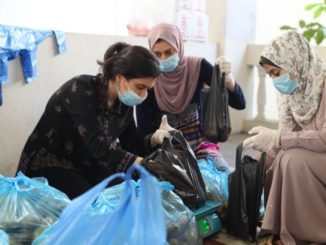
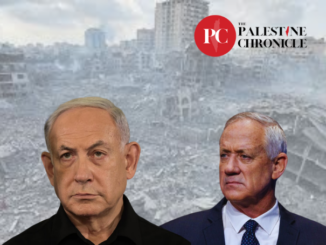
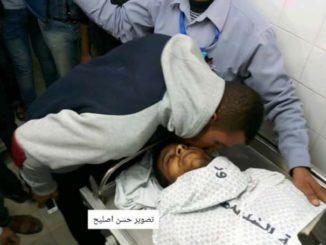


Right on! Truly, right on!